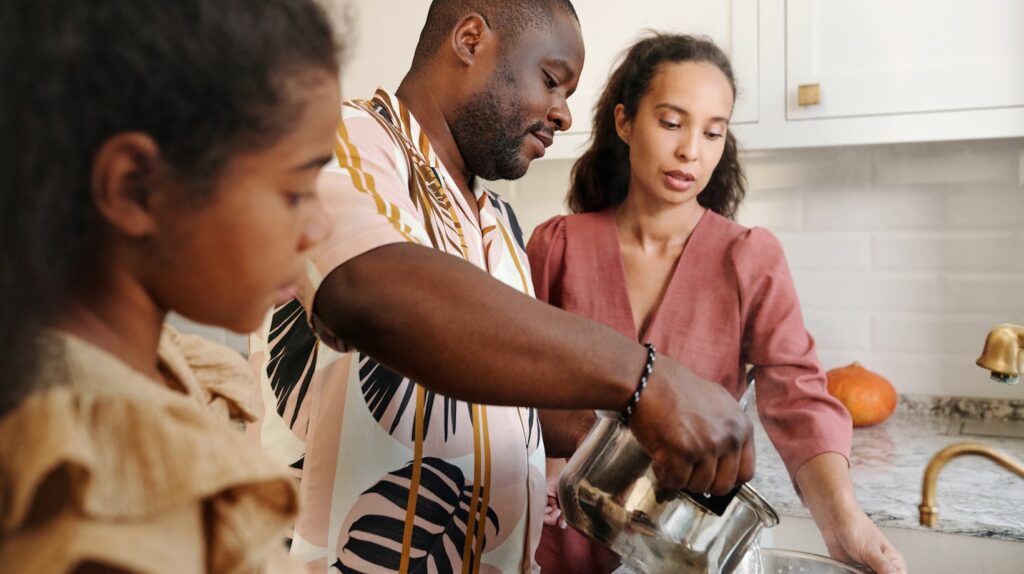Finding meaningful ways to support child development today can be challenging. However, one delightful and effective method is cooking together. This activity not only brings families closer but also provides numerous benefits for a child’s cognitive, emotional, and social development. Let’s explore how cooking can be a powerful tool for nurturing your child’s growth.
Fostering Cognitive Skills
Cooking is a practical way to enhance a child’s cognitive abilities. When children engage in cooking, they practice important math skills by measuring ingredients, counting, and understanding fractions. For example, doubling a recipe or halving it helps children grasp mathematical concepts in a real-world context.
Additionally, cooking encourages children to follow sequences and instructions, which enhances their reading comprehension and attention to detail. Reading a recipe, understanding steps, and following them in order promotes critical thinking and problem-solving skills. As they become more adept in the kitchen, children learn to anticipate steps, plan, and adapt to changes, further honing their cognitive abilities.
Cultivating Cultural Awareness
Cooking together also offers a platform for exploring different cultures and traditions. By preparing dishes from various cuisines, children learn about diverse cultures, customs, and ingredients. This exposure fosters cultural awareness and appreciation, helping children develop a broader perspective and respect for diversity. For instance, they might learn where do olives come from or how different spices are used around the world.
Parents can use cooking as an educational tool to teach children about their heritage or introduce them to new cultures. This not only enhances their knowledge but also instills a sense of curiosity and openness towards the world around them.
Enhancing Fine Motor Skills
Cooking involves a variety of physical tasks that help develop fine motor skills. Tasks such as stirring, kneading dough, and cutting vegetables require precise hand movements and coordination. These activities strengthen the muscles in the hands and fingers, improving dexterity and hand-eye coordination.

Moreover, fine motor skills developed in the kitchen translate to other areas of a child’s life, such as writing, drawing, and using tools. By regularly engaging in cooking, children refine these skills, making everyday tasks easier and boosting their confidence in their abilities.
Promoting Emotional Development
Cooking together provides an excellent opportunity to support a child’s emotional development. It fosters a sense of accomplishment and self-esteem when children successfully complete a dish or contribute to a meal. The positive reinforcement they receive from their parents or guardians further boosts their confidence and encourages them to take on new challenges.
Additionally, cooking can be a therapeutic activity that helps children express their emotions. The process of creating something from scratch allows them to channel their feelings into a productive and enjoyable task. It also provides a safe space for conversations, enabling parents to connect with their children on a deeper level and address any concerns or emotions they may have.
Encouraging Healthy Eating Habits
Involving children in the cooking process can have a significant impact on their eating habits. When children participate in preparing meals, they become more interested in trying new foods and making healthier choices. They gain a better understanding of nutrition and the importance of balanced meals.

Parents can use cooking as an opportunity to educate children about different food groups, the benefits of various ingredients, and the importance of portion control. This hands-on learning experience empowers children to make informed decisions about their diet, fostering lifelong healthy eating habits.
Strengthening Family Bonds
One of the most significant benefits of cooking together is the strengthening of family bonds. In today’s busy world, finding quality time to spend as a family can be difficult. Cooking provides a perfect opportunity for families to come together, share experiences, and create lasting memories.
Working as a team in the kitchen encourages communication, cooperation, and collaboration. It teaches children the value of teamwork and the importance of supporting one another. These shared experiences help build a strong foundation of trust and connection within the family.
Conclusion
Cooking together is more than just preparing meals; it’s a valuable opportunity to support your child’s development in multiple areas. From enhancing cognitive and motor skills to promoting emotional growth and healthy eating habits, the benefits are extensive. Moreover, the shared experiences in the kitchen strengthen family bonds and foster cultural awareness. So, roll up your sleeves, gather your ingredients, and embark on a culinary adventure with your child. The rewards will be as delightful as the dishes you create together.
